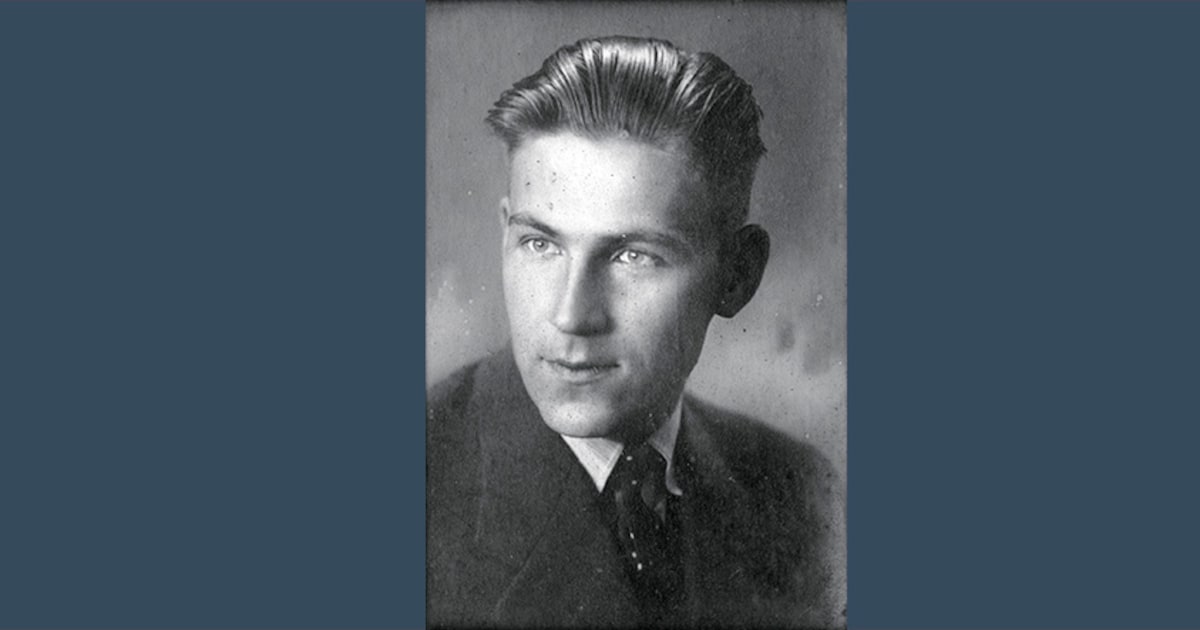
Henk van Randwijk: You could call him the Elvis of the Dutch resistance. As a child he had a beautiful voice (his wife Ada fell in love with it) and the same jet-black hair combed back. He was also vain and domineering. But at the same time a great resistance fighter; he was the driving force behind the illegal newspaper Free Netherlands.
But Henk van Randwijk’s verses are now better known than the resistance fighter himself, says historian Peter Bak. “A people that gives in to tyrants / will lose more than lives and property / then the light will go out”: the lines are written on a wall in the centre of Amsterdam and are often quoted.
According to Bak, author of several books on, among other things, illegal trafficking Fidelity, It’s time to rediscover Van Randwijk. And especially his work. In the shadow of yesterdayIn the 1960s, the resistance fighter wrote his war memories in a series of General Handelsblad.
The columns were collected and published after his death. Students received the “Bible of Resistance” as a gift in droves. These students are now older and are cleaning out their bookshelves. In the shadow of yesterday It is available in large quantities at Boekwinkeltjes.nl for just a few euros, Bak noted. It is a kind of book cemetery.
You were so captivated by this book that you yourself wrote a book about it. Why?
“In the shadow of yesterday “It is one of the best books about the years of occupation. It is not just any story, but a book of flesh and blood. Henk van Randwijk was a very determined man full of ideals, who began to resist at an early age. There was something overwhelming about him, but he also always doubted himself. That makes him very human and vulnerable.”
So why not adopt all those orphaned books?
“I think it’s too much for nine out of ten people. You need a lot of background knowledge to understand what he means. I hope to contribute to this with my book.”
You spent some time with Van Randwijk while writing. How would you characterize him?
“Like a barrel full of contradictions. On the one hand he was brave, otherwise you wouldn’t join the resistance, but on the other hand he was a scared child. When he was in prison, it was his cellmate, a baker, who kept him afloat. He himself wouldn’t have been able to last a week. He tested others to the limit, but he himself was no saint. He had an affair with the messenger Aa van der Meer for six years, his wife knew about it. But he couldn’t stop.”
Van Randwijk was too dominant, thought a group of distributors. He thought they were too wild. From this conflict arose the illegal Fidelityin 43. Did things ever work out between Van Randwijk and…? Fidelity?
“Van Randwijk is in the circles of the old ones. Fidelity-The resistance was always a black sheep, because it wanted to be the big boss. Van Randwijk, for his part, has never forgiven the distributor Wim Speelman for being with others. Fidelity has started. He took over much of the distribution apparatus. Free Netherlands with him. And Fidelity proclaimed a message that was at odds with the content of Free Netherlands was standing.”
When Van Randwijk was delirious on his deathbed, he said: “We could have done more for the Jews.” Is that also typical of him?
“Yes. He suffered a lot of guilt, though, not only because of his extramarital affair. He always wondered whether he had done enough for the Jews, even though he himself had welcomed them. He criticised the attitude of the Dutch people during the war, who shortly after the war were seen mainly as a brave nation.”
Van Randwijk paints a pessimistic picture: we were a weak people. Is this image correct?
“The title of my book is not without reason. The people who give in to tyrants with three points behind. Have we given in? In short, not for National Socialism, Van Randwijk saw this too. There was resistance and help was given to those in hiding. But on the other hand, up to three quarters of the Jews have been deported.
“So the question remains: have we been cowards? Three times in the book I quote a diplomat who says about the Dutch persecution of Jews: “People don’t agree with it, but they don’t do anything about it either.” This aid to people in hiding really began when many Jews had already been deported.”
For Van Randwijk, was writing about the war a form of therapy or self-flagellation?
“Both. He himself described the writing as “a journey through hell”, thinking of the deported Jews, but also of the better world he spoke of. Free Netherlands He had written nothing and was not finished. He expressed it – he remained a man of letters – in beautiful phrases: his desk lamp radiating a freezing cold in the middle of the night. All that writing was also therapy. A few years before his death he moved to the village of Ilpendam, where he lived on a dead end road. There he relaxed and the tone of his pieces changed: more understanding. As if he knew: heroism is not for everyone.
Peter Bak, A people that gives in to tyrants… The war of Henk van Randwijk. Eburon Publishers
Read also:
Nelly worked in the resistance as a child and suffered from this throughout her life. ‘You are strong, but you are not either’
As a child, Nelly van Bommel-Den Hartog (93) was used by her mother to perform dangerous resistance work and distribute illegal Trouw. “My mother did the right thing, but at the expense of her children.”



